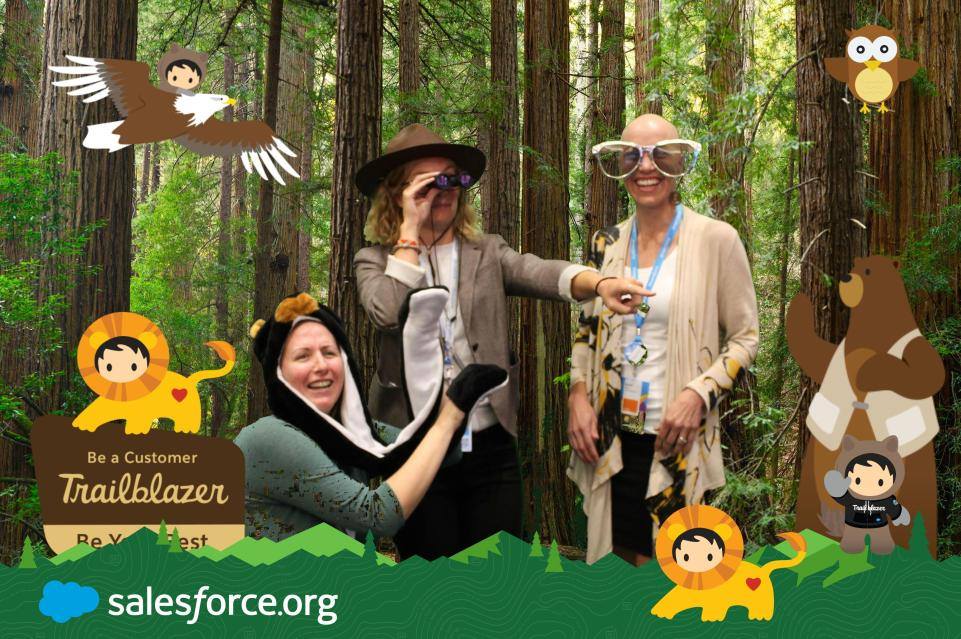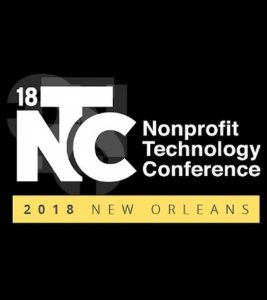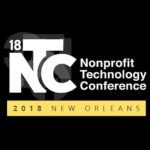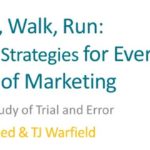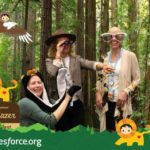Since our Dreamforce Cascade session last year, we have had several inquiries and requests about resources from making the transition from Salesforce Administrator to Consultant. We’re going to quickly hit the important factors to think through before you make this shift so your career move will be as successful and satisfying as you hope it will be.
Natural career path
The important thing to know is that there is only so much growth in the technical sector of the nonprofit world. After being a System Admin, you may become your Org’s business analyst, but if you are good at what you do, you will work your way out of a job. You may get the systems into such a fine-tuned machine that the Org doesn’t need someone has highly skilled as you anymore. The more effective and experienced of a system administrator you become, the harder and harder it becomes to stay interested and challenged in your work. Moving from working for one organization to consulting for several keeps those challenges and interesting work opportunities fresh and relevant.
Nonprofit Background
You, as a System Administrator, know more than anyone else how important it is that your consultant have a firm grasp on how nonprofits do business and now Salesforce is utilized to meet those goals. If you are considering making the move to the consultant world, make sure you have the skills to put on your resume that proves that you are not just a nonprofit employee, but are a nonprofit expert and advocate.
Project Management
I am sure at least once in your career thus far, you have been a part of a project that fell to pieces due to be poorly managed. As a consultant and a nonprofit partner, you will be shepherding projects of all sizes. You need to be able to walk the client though a discovery phase to help them scope out their needs, create a project timeframe and budget, manage the project and know when the project needs reassessment or is at risk. Even if you are a part of a larger team, having strong time management skills is paramount. There is no job that wouldn’t be improved by better project management skills. Get your nonprofit to send you to class, do online trainings or independent reading on how to better manage your projects.
Certifications are Mandatory
As a Salesforce Administrator, it looks good to have a certification or two on your resume. When you make the move to the consulting partner world, these are no longer nice to haves. Salesforce.org Partner programs require their partners to maintain a certain number or percentage of staff to hold current certifications. As a nonprofit employee, these certification training and tests are discounted. If you are thinking making the switch, get as many certifications under your belt as you can as a nonprofit employee. Any Salesforce certification doesn’t cut it though, all require a System Administrator certification first, so focus on that and then those that will make you look more appealing to potential consulting employers. Certifications are serious currency in the consulting world.
What Kind of Consultant Do You Want to Be?
There are several ways to join the consulting ecosystem. Do you want to stay a nonprofit employee while working on the side as a consultant? Maybe you still love your job, but there isn’t enough to keep you busy. Doing consulting on the side is a great way to keep yourself interested, get more access to organizations you love and make some extra money while you are doing it. Maybe you want to be your own boss and want to go full freelance. Or, maybe you project that will keep your skills honed and your appetite for new challenges sated, but you don’t want to deal with marketing and sales like you would if you are a freelance consultant. In that case, finding a consulting firm that matches your values is the way to go.
Leaving the Nonprofit Staff Bubble
TJ: The biggest adjustment that I had to come to terms with was that I was no longer truly part of the nonprofit community. As a Salesforce Consultant, you join a new community with its own set of expectations, rules, relationship and members. Salesforce has been committed to focusing on the nonprofit more and more, so when you cross over to the consulting side of the fence, you are no longer a cherished customer, but become a supportive partner – both to the nonprofit world and to Salesforce.org. There will still be ways to make an impactful difference in the nonprofit industry, but you need to find the right path to do so as a partner.
Rebuild Your Brand
As you will no longer be a nonprofit employee, you will need to rebuild your brand and visibility. Keep in mind that since the HUB and other Salesforce forums are linked to your nonprofit user record, all activity, ranking and reputation points go away when you move to your new consultant persona. You’ll need to find ways to establish yourself as a nonprofit and Salesforce evangelist. You need to establish your skills and knowledge as your own, and not your nonprofit.
Are you a People Person or a Lone Wolf?
Telecommuting is extremely common in the consulting world. Therefore, it is extremely important that you know yourself and how you best work. Some folks need the office vibe and energy of working with people in person to get their juices flowing. Other people work best with little need for regular human interaction. Finding out if you need to find a position that is more structured and tradition versus being able to work fully from home in your jammies while still keeping yourself on track and connected to your clients is necessary before you start looking for consulting gigs. Working remotely is not for everyone. There is the challenge of having little to no human contact but still needing to stay a tight, cohesive team while making your clients feel like you are accessible can be an insurmountable challenge to some. Do you have a quiet space you can use as an office at home, do you need some structure and need to find a shared workspace or do you need to find a firm that hold normal office hours?
Billable Hours is Not the Same as Your Work Week
The billable versus hours worked is often overlooked when making the move to a consultant. Estimate that your billable hours only accounts for 50-70% of your hours worked. Depending on how many internal meetings, collaboration and nonbillable projects you have, the billable hours may very well be 50% of your workload. Theresa: The most challenging part of the transition for me was needing to shift my mindset in regards to time-tracking. You really need to stay on top of how you use your time. Not all tasks are worthy of your time once you go to a billable model and learn just how precious your time is. Also, un-learning that everything is a fire drill and needs to be addressed immediately took some getting used to. In reality, it is okay if you don’t get to something right away, as long as you are clear with the client as to when you will get it done.
When You Are Ready to Start Interviewing
Employers always expect interviewees to have questions. Make sure you know which of these are important to you, and press for clear answers. Starting the consulting world with unclear and possibly conflicting expectations is a good way to get burned.
- W-2 or 1099? Is the position a staff position or contractor? If it is a 1099 contractor position, you won’t get benefits, you will have to pay your own taxes and the salary should therefore be higher than the staff version of the same position.
- Billable hours – how do your billable hours get calculated? Weekly? Monthly? Quarterly? Because of the nature of consulting, having a hard-set number of billable hours on a weekly basis can be a real challenge. One week, the project(s) are on a lull, while the next is bursting with work. Having a chunk of billable hours as your goal and being able to be more flexible in hitting those over a longer period of time is much easier on your stress level and overall quality of life.
- Is the position onsite or telecommute? If it is telecommuting, what tools does the company utilize to keep the team connected?
- What are the values of the organization? What are the driving factors of the consulting firm? Are they all about numbers and profit, do they only focus on certain sectors in the nonprofit field? Do they match with your expectations and values? Working for a company lacking in values or having conflicting values than you are good ways to quickly get disenfranchised with the consulting world.
Welcome to the Salesforce Consulting World
Theresa: A year later, I feel great about my decision about switching to consulting. I have more control over my schedule, I’ve developed expertise in tons of useful tools for nonprofits and I get to work with new nonprofits all the time. No day is ever really the same, and I really enjoy that.
TJ: For many reasons, I was hesitant to make the switch. But, I found a group of like-minded women that hold the same values as I do and have similar goals in our working lives: make a decent living while making a significant impact to nonprofits whose missions we are passionate for while having the flexibility to be abundantly involved in my life, my love of a four-year-old son. By being thoughtful of all these considerations, I can say that I am the happiest I have ever been in my career.
